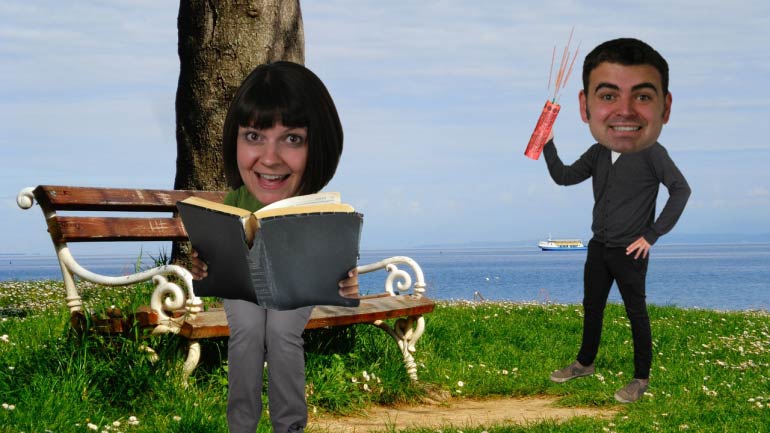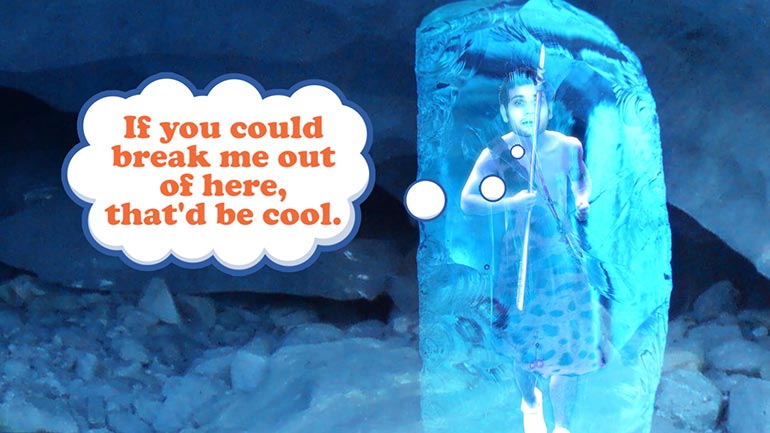ShmoopTube
Where Monty Python meets your 10th grade teacher.
Search Thousands of Shmoop Videos
ELA 3: Whale Migration 10 Views
Share It!
Description:
Whale whale whale, what do we have here...a video about whale migration? Nice. We've been feeling a little overwhalemed with intrigue on the subject lately.
Transcript
- 00:05
[Dino and Coop singing]
- 00:13
Why do whales migrate?
- 00:15
Is it out of boredom?
- 00:16
Do they have a timeshare somewhere? [Whale floating in the ocean]
- 00:18
Actually, there are a few reasons—none of which involve resort condos. [Whale in a swimming pool]
Full Transcript
- 00:22
Water temperature, ocean depth, climate change, and the biggest reason…food. [Coop pointing at a blackboard]
- 00:27
Different types of whales have different migration patterns.
- 00:30
We’re going to focus on two particular kinds of whales for now—the blue whale and the
- 00:33
humpback whale.
- 00:34
The blue whale travels to warmer waters in the winter time to give birth to its babies, [Thermometer at the top]
- 00:38
and to the colder waters in the summer time for food. [Thermometer shows the temperature getting lower]
- 00:41
It’s a real bummer when it gets the two mixed up. [Snowman appears]
- 00:44
The blue whale travels thousands of miles to go from the tropical waters of the Southern
- 00:47
Hemisphere to the cold waters of the Arctic… or the Antarctic. [Migration routes shown by arrows]
- 00:51
aka Penguin Central.
- 00:52
It usually stays in the colder waters for 3 or 4 months, feeding on krill.
- 00:57
If it’s lucky, it’ll make a real, uh…krilling. [Whale eating the krill]
- 01:00
When it comes time to migrate back, the older whales tend to migrate first, with the younger [Whale with a beard and glasses]
- 01:04
whales coming later.
- 01:05
Sorta the equivalent of elderly humans getting up at the crack of dawn, and the younger humans [Old guy outside at sunrise]
- 01:09
sleeping in until 3 pm.
- 01:11
During migration, blue whales eat… nothing.
- 01:14
Nada.
- 01:15
They depend solely on the food they have stored up in their bodies.
- 01:18
The females give birth in warm waters because baby whales only have a thin layer of blubber, [Baby whale]
- 01:22
or fat, to keep them warm.
- 01:24
And there usually aren’t any swaddling experts on hand… [Vet holding on to a baby whale in a blanket]
- 01:27
Humpback whales also spend the winter in warmer waters and the summer in colder waters.
- 01:32
They make these journeys every year from the Northern to the Southern Hemisphere, or vice versa. [Whale travelling through the ocean on a globe]
- 01:36
Just imagine how many frequent swimmer miles they must have saved up. [Whale checking frequent swimmer miles on a computer]
- 01:39
Humpback whales swim very slowly during migration—
- 01:42
only about one mile per hour.
- 01:44
They swim slowly because they’re socializing along the way. [Speed camera shows 1mph]
- 01:47
You can’t hurry good company and even better conversation… [Two whales swimming together and chatting]
Up Next
ELA Drills, Beginner: Point of View. Is the statement in the video true or false?
Related Videos
ELA Drills, Beginner: Textual Analysis 1. The purpose of the instruction manual was...what?
ELA Drills, Beginner: Point of View 3. Which sentence in the passage best shows the narrator's point of view on the topic of Chelsea Simpson?
We wanted to make a video about sedentary rocks, but we couldn't get lazy uncle Rocky off the couch. Oh well. We'll teach you about sedimentary roc...
Today we're bringing you the opposite of Jurassic Park—how living things become fossils. Okay okay, it might not be quite as fun...but hey, at le...




